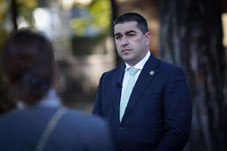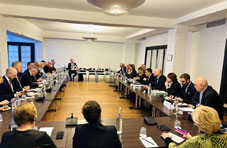The News in Brief
Tuesday, November 12, 2024
Prepared by Messenger Staff
Papuashvili Rejects Meeting with EU Delegation, Cites Political Bias
 Chairman of the Georgian Parliament, Shalva Papuashvili, declined to meet with visiting lawmakers from eight European Union countries, citing what he described as the delegation's "unfriendly attitude" and "political bias." In a written statement, Papuashvili criticized certain members of the delegation, particularly Lithuanian MP Zygimantas Pavilionis, for previously supporting Georgian opposition parties and allegedly interfering in Georgia's recent elections. He stated that "this involvement violated principles of non-interference", claiming that such actions contributed to "political polarization" and damaged trust in European institutions within Georgian society.
Chairman of the Georgian Parliament, Shalva Papuashvili, declined to meet with visiting lawmakers from eight European Union countries, citing what he described as the delegation's "unfriendly attitude" and "political bias." In a written statement, Papuashvili criticized certain members of the delegation, particularly Lithuanian MP Zygimantas Pavilionis, for previously supporting Georgian opposition parties and allegedly interfering in Georgia's recent elections. He stated that "this involvement violated principles of non-interference", claiming that such actions contributed to "political polarization" and damaged trust in European institutions within Georgian society.
Papuashvili also referenced past instances where EU members voiced support for "false narratives," such as claims surrounding the detention of former Georgian President Mikheil Saakashvili. He asserted that some EU politicians' rhetoric and actions risk undermining Georgia's stability and democratic process, warning that using "the EU enlargement process as a weapon" to challenge election outcomes would erode public trust.
Papuashvili affirmed Georgia's openness to dialogue with other members of the delegation, provided it respects principles of sovereignty and equality, signaling that only constructive parliamentary diplomacy would be welcome.
EU Delegation Meets Georgian Opposition Leaders
 EU delegation from 8 countries visited Georgia to address the political crisis following contested elections. After meeting with President Salome Zourabichvili, the delegation met with opposition leaders. The talks focused on the alleged election irregularities, the prospects for an independent investigation, and possible EU responses to actions taken by the ruling Georgian Dream government.
EU delegation from 8 countries visited Georgia to address the political crisis following contested elections. After meeting with President Salome Zourabichvili, the delegation met with opposition leaders. The talks focused on the alleged election irregularities, the prospects for an independent investigation, and possible EU responses to actions taken by the ruling Georgian Dream government.
Dimitri Tskitishvili from the Gakharia-For Georgia party highlighted the meeting's focus on devising a collective opposition strategy. He noted that discussions covered potential solutions, the risks Georgia faces, and the anticipated responses from GD. Tskitishvili said the conversation was essential for aligning the opposition's stance, both individually and as a unified force.
Zurab Japaridze from the Coalition for Change underscored the potential consequences if Georgian Dream continues its current course. "There was talk that not only could Georgia's European integration be halted, but we might also lose benefits such as free trade, visa-free travel, and candidate status," he warned.
Badri Japaridze from Strong Georgia stated that the EU's response could become increasingly severe. He linked the EU's potential actions to the Georgian Dream's perceived "anti-European" direction, adding that GD's moves are jeopardizing Georgia's standing in Europe.
Papuashvili Rejects Meeting with EU Delegation, Cites Political Bias

Papuashvili also referenced past instances where EU members voiced support for "false narratives," such as claims surrounding the detention of former Georgian President Mikheil Saakashvili. He asserted that some EU politicians' rhetoric and actions risk undermining Georgia's stability and democratic process, warning that using "the EU enlargement process as a weapon" to challenge election outcomes would erode public trust.
Papuashvili affirmed Georgia's openness to dialogue with other members of the delegation, provided it respects principles of sovereignty and equality, signaling that only constructive parliamentary diplomacy would be welcome.
EU Delegation Meets Georgian Opposition Leaders

Dimitri Tskitishvili from the Gakharia-For Georgia party highlighted the meeting's focus on devising a collective opposition strategy. He noted that discussions covered potential solutions, the risks Georgia faces, and the anticipated responses from GD. Tskitishvili said the conversation was essential for aligning the opposition's stance, both individually and as a unified force.
Zurab Japaridze from the Coalition for Change underscored the potential consequences if Georgian Dream continues its current course. "There was talk that not only could Georgia's European integration be halted, but we might also lose benefits such as free trade, visa-free travel, and candidate status," he warned.
Badri Japaridze from Strong Georgia stated that the EU's response could become increasingly severe. He linked the EU's potential actions to the Georgian Dream's perceived "anti-European" direction, adding that GD's moves are jeopardizing Georgia's standing in Europe.
